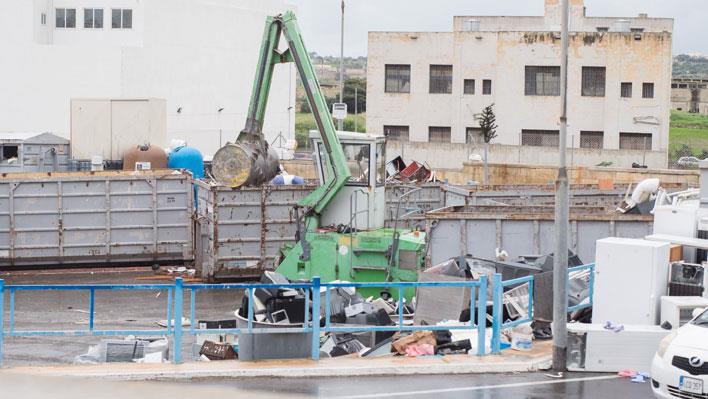There is no space left at WasteServ’s Civic Amenity (CA) sites due to an accumulation of Waste Electrical and Electronic Equipment (WEEE), the disposal of which seems to have stalled.
WEEE are those items that work with batteries or electricity, and they fall subject to an EU directive which provides for the creation of collection schemes where consumers return their used waste equipment free of charge. The objective of these schemes is to increase the recycling and/or re-use of such products, and each country has a set target of recycled items to reach.
A study into WEEE by the EU’s statistics body Eurostat shows that there is no data available for how much Malta’s collection rate was in 2015 and 2016. The most recent data available is for 2014, which shows an 11.9% collection rate – the lowest in the EU. The EU’s annual target collection rate as of 2016 is 45%.
The collection rate is calculated by Eurostat on the basis of the total weight of WEEE collected in a given year in the Member State concerned, and expressed as a percentage of the average weight of EEE placed on the market in the three preceding years in that Member State.
In Malta, there are two schemes which take care of WEEE recycling; WEEE Malta and WEEE Recycle. The system works in that WEEE items are picked up by bulky refuse collectors and then deposited at WasteServ’s CA sites, from where they would be picked up by either of these two schemes and then shipped off to be recycled.
However, speaking to the Malta Independent, WasteServ CEO Tonio Montebello said that these schemes were not picking up the WEEE, and that as a result the waste was being left to take up space at WasteServ.

WasteServ had been forced to take the matters into its own hands as a result, Montebello said, and in fact it had disposed of the WEEE itself in 2016 and 2017. However, due to the lengthy process required to obtain a permit to export waste – it takes around six months to get a permit to export to Italy, Montebello explained – there has been a buildup of waste at the CA sites this year.
Montebello lamented that it was WasteServ who bore the brunt of criticism, even when the issue at hand wasn’t their fault. In fact he said they were trying to find alternatives to the situation; a private warehouse had been rented as storage, and the Hal Far CA site was also used. However it came to the point that the Hal Far site had to be emptied due to the implementation of another project, meaning that there is simply no space for anymore waste.
As a result, WasteServ was left with no other option than to advise bulky refuse collectors to take non-WEEE items directly to Maghtab – which is their final destination anyway – and for them to deal directly with the two schemes in the case of WEEE items.
These instructions however induced the bulky refuse collectors into calling a strike for last Wednesday. This industrial action was only narrowly averted after WasteServ withdrew the instructions. It has meant that waste is still being brought to WasteServ, and Montebello said that temporary measures, such as the re-use of the Hal Far CA site, have had to be implemented until a solution is found.

Montello told this newsroom that it is ERA – the Environment and Resources Authority – which is responsible for regulation over these schemes.
Contacted by the Malta Independent, ERA said that in accordance with the Regulations for Waste Management (Electric and Electronic Equipment), there was the legal obligation that WEEE deposited at the local agency chosen by the Ministry, in this case being WasteServ, has to be sent to the schemes that export this waste.
Despite this, ERA confirmed, “there has been an accumulation of WEEE waste at WasteServ’s plants”.
ERA said that a number of entities including themselves were working hand-in-hand to see that the problem is solved.
ERA also noted that one needs to keep mind that thus far there are no local plants that can treat such a type of waste, and that this means it must be exported – which means that it must conform to several procedures and requires all the necessary local and international permits. Another difficulty, they said, is that since Malta is an island, all exportation needs to take place through trailers or containers and shipping lines.
ERA said that they hoped that with everyone’s collaboration the problem would be solved as soon as possible, however they added that as the regulator over this matter, ERA will not exclude that action be taken against the parties that had the obligation to see that this accumulation does not happen and to see that the waste is exported in a suitable time frame as is specified by the law.